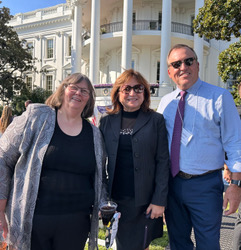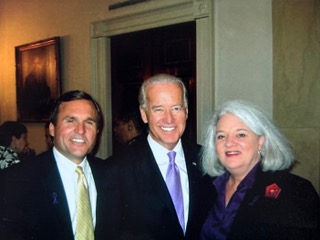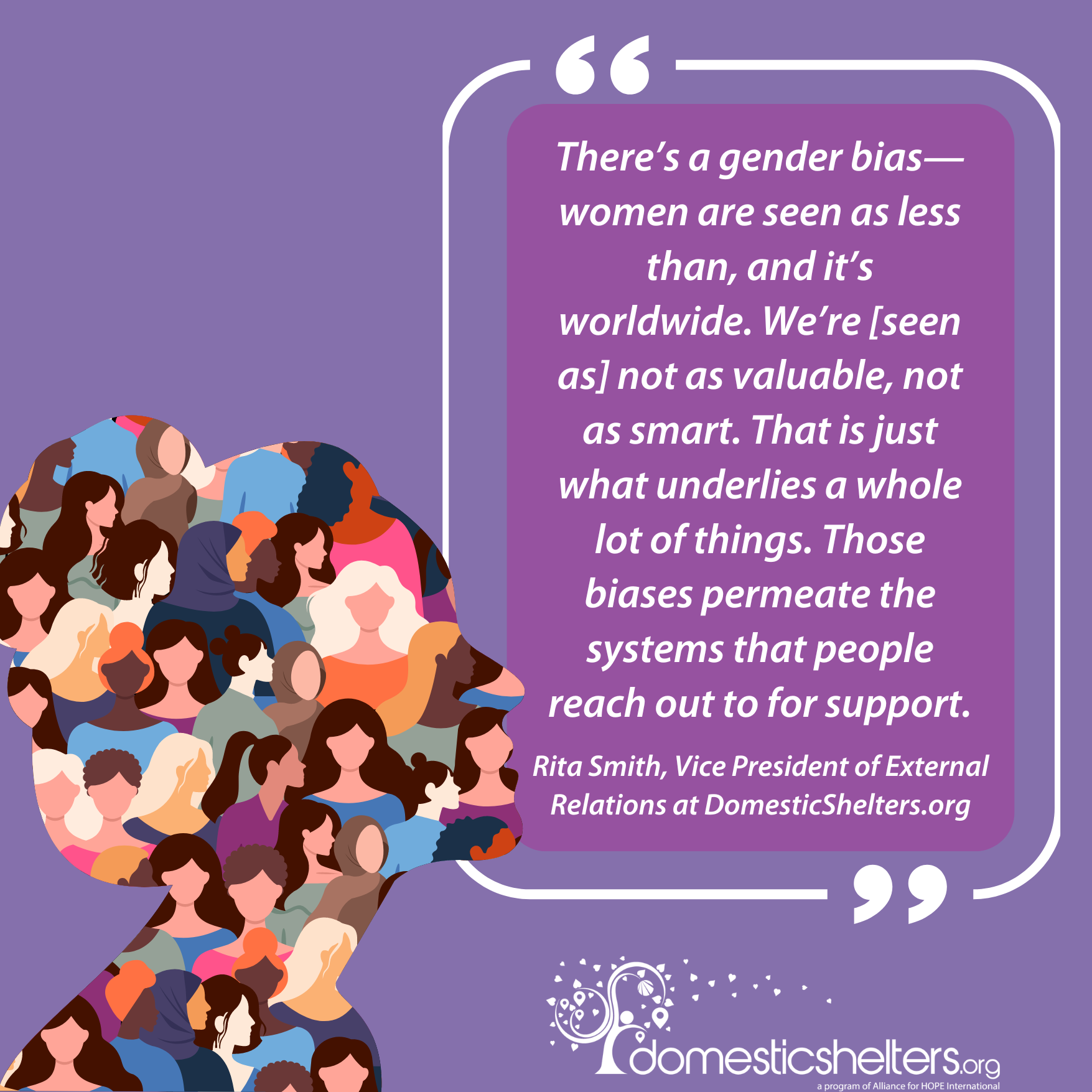1. Select a discrete app icon.

notes
It's the 30th Anniversary of the Violence Against Women Act
The Department of Justice just announced $690 million towards preventing violence against women
- Sep 24, 2024

Above: Rosie Hidalgo, Director of the Office on Violence Against Women, speaks about VAWA's monumental anniversary.
This month marks the 30th anniversary of the Violence Against Women Act (VAWA) and it’s something to celebrate. The Department of Justice announced this week that they are allocating $690 million in grants to support services for survivors of domestic and dating violence, sexual assault and stalking across the U.S. and many tribal nations.
“The power of VAWA is that it is centered on the lived realities and leadership of survivors. By identifying what works well that can be expanded and enhanced, and identifying gaps and barriers, we can continue to improve VAWA and ensure that we are supporting all survivors, including those from historically marginalized communities and underserved populations who often face multiple barriers to services and safety,” said the Office on Violence Against Women Director Rosie Hidalgo.

The Behind-the-Scenes Work to Get VAWA Passed in 1994
If anyone remembers the Schoolhouse Rock ditty “How a Bill Becomes a Law,” then you remember the process of making permanent government-decreed change isn’t an easy one. It’s often the joint effort of a multitude of dedicated individuals who all believe that change can, and should, happen.
Debby Tucker was one of those people for VAWA. At the time, she was the founding chair of the National Network to End Domestic Violence (NNEDV), a group that helped lead the charge to pass VAWA in 1994. The organization brought in the voices from state coalitions working with local domestic violence service and advocacy organizations, those closest to victims and survivors of domestic violence, as well as encouraging participation by the national and state organizations for sexual assault programs in providing input to VAWA. Tucker tells the story of this bill being passed the way your favorite Southern aunt might sit you down in her kitchen with a glass of lemonade and reminisce about the good ol’ days.
“Oh, it took a lot of leg work of going to offices way outside of my range. I was not responsible for the state of New York, for example, but I ended up meeting with almost every member of the New York delegation. I did everything I could from the Southern Belle School of Lobbying to call on everybody and make an impression,” she says with a laugh. Her marching orders came from then-Senator Joe Biden, the author of the bill.
“I got some very specific assignments along the way from Senator Biden,” says Tucker. “Jack Brooks was probably the most important one.”
Jack Brooks (D- Tex.) served 42 years in the House of Representatives, from 1953 to 1995. He passed away in 2012 at the age of 90. Tucker says it wasn’t easy reaching him, but she could reach people who could contact him, and she called them all.
After a year of politely but insistantly reaching out to his staff in DC and contacting leaders in both DC and Texas, she got a call from Rep. Brooks' staff indicating the bill was long-last being set for a hearing in the Judiciary Committee. Tucker's presence was requested at once. Her excitement was palpable as she arrived—it appeared all the hard work of the advocates who believed in the bill was going to pay off.
As she waited for the hearing she began to visit some of the members seated at the dais. She had her back to the door when suddenly it became very quiet. Turning around to see why, Tucker found herself face-to-face with Rep. Brooks as he walked up the aisle. He was smoking a very large cigar, she remembers, nothing unusual for the early ‘90s in spite of the signs on all four walls indicating “No Smoking.”
“I quickly thrust out my hand and said, ‘Mr. Brooks, as chair of the National Network to End Domestic Violence and on behalf of all of us involved in ending violence, I want to thank you for setting the Violence Against Women Act for a hearing today in your Committee.’” She doesn’t remember what else she said, but she does recall the legislator's reply.
“Debby Tucker, goddammit, I’ve had everybody but my first-grade teacher call me and tell me I had to set this bill for a hearing and there was just no question I had to get this done.”
Then, he continued.
“OK, we’re going to have this hearing, but I just want to know one thing,” Tucker remembers him saying. “Why the f*ck don’t the prosecutors help these women? I mean, why don’t they put these men in jail and give the women a chance to be safe instead of having to go to your little shelters?”
Tucker was stunned by the question, but ready with a reply to match.
“I said, ‘Well sir, I don’t f*cking know.’” She laughs. “And he loved it. He leaned in to give me a hug with this big cigar in his mouth”—Tucker pronounces it “sea-gar” just so you know—“and my hair caught on fire!”
Rep. Brooks began patting Tucker’s head to put out the flames. She was okay except for the smell and being unable to focus for about 10 to 15 minutes , walking to her seat with a lifelong memory of that moment.
“I still have a patch where my hair won’t grow.”
By the end of the day, the negotiations among members, staff and advocates resulted in a form of VAWA that passed the House. With Senators Biden and Hatch as authors and key support from many others, including Sen. Ted Kennedy advocating for the National Domestic Violence Hotline, VAWA would soon wind up on then-President Bill Clinton’s desk where he would sign it into law. It had taken four years of lobbying since Sen. Biden had first drafted VAWA in 1990 however the speed in 1994 was incredibly rapid.

Many opposed a provision in VAWA that allowed victims of gender-based violence to sue the person who harmed them. The National Association of Women Judges was the only judicial organization to support it and worked with the Senate Judiciary Committee to refine its language to meet the concerns of those who were in opposition. When the bill passed in 1994, it still contained the provision and almost everything advocates said they wanted.
There was also serious opposition to permitting immigrant survivors to self-petition to remain in the United States. They would be able need to have the person harming them as their sponsor necessary to the filing of a request to remain in the country. Most of these immigrant survivors had children born in the U.S. who were citizens from whom they’d be separated from without legal status. However members of the House Judiciary worked hard to come to a consensus supported by the Senate Committee and the provision was included.
Rita Smith, Vice President of External Relations at DomesticShelters.org, was another key player in helping to get VAWA passed. At the time, she was the founding director of the National Coalition Against Domestic Violence, a position she held for 22 years.
“I played a more behind-the-scenes role, working with Biden and Orin Hatch, who were the key sponsors,” says Smith. Hatch (R- Utah) served in the Senate for 42 years. He passed away in 2022 at the age of 88.
“We’d hear about who we needed to put pressure on, who we needed to educate, and get that information out,” Smith says.
When asked why she thought President Biden took on violence against women as a personal plight, she says she gives a good amount of credit to his wife, Jill.
“Dr. Jill Biden was an educator who worked with students and had a clear understanding, in many ways, of the issues they faced. I think he started to learn in a pretty personal way what the impact was for women looking for safety.”
Smith says Biden’s eagerness to ask for input from advocates like herself and Tucker made him a champion for women.
“He was a man who was willing to listen and learn, which is critical for people like senators who have power and who can create policy that helps save lives.”

Two Murders in 1994 Helped Push VAWA Through
Smith would be remiss, she says, to not mention an event in June of 1994 that tragically gave VAWA the attention it needed by lawmakers.
“VAWA had gotten stalled, but in September, Nicole Brown Simpson’s sister, Denise Brown, came to testify in front of Congress.”
On June 12, Simpson and her friend, Ron Goldman, were murdered outside Simpson’s California home. Simpson’s then-husband, former NFL player O.J. Simpson, who had used violence, abuse and coercive control against his wife during their eight-year marriage, was accused of their murders. But after a contentious and public trial lasting nine months, he was acquitted. He was found liable in a civil trial two years later. Smith called the murders a flash point for domestic violence awareness.
“I think it’s important to honor the tragic loss of the two lives that brought so much attention to the issue. I want to give Nicole Brown Simpson and Ron Goldman recognition because their lives had such an impact.” However, adds Smith, “It shouldn’t take people dying. It shouldn’t take this kind of tragedy to make people care.”
Has VAWA Done Enough?
This question is hard to answer for advocates I spoke to about VAWA. There’s a desire to be positive in the face of the clearly ongoing epidemic of violence against women. Says Smith, “We’ve made significant progress in many ways. There’s information and resources available that didn’t exist 30 years ago and are there for anyone to access and learn from to work effectively in their community.”
Since its inception, VAWA has awarded over $8 billion in grants and cooperative agreements to 19 different grant programs. The largest grants, representing about 40 percent of annual grants, fund domestic violence and sexual assault programs and shelters. They also help strengthen effective law enforcement and prosecution strategies to combat violent crimes against women.
“It’s stunning,” says Tucker of the three decades of progress. “If I didn’t look in the mirror and be shocked that all my hair is gray, I wouldn’t believe it’s been this long. It's so amazing what’s been accomplished.”
One subsequent development of note, Tucker says, was the funding of the Family Justice Center Initiative (FJC) in 2003, led by then-President George W. Bush. The President based his initiative on the first FJC opened in San Diego by then-San Diego City Attorney Casey Gwinn, the year prior. Gael Strack, now the CEO of Alliance for HOPE International was the first Director of the San Diego Family Justice Center. Allotting $20 million, the initiative set out to create 15 additional FJCs around the country modeled after the success in San Diego, allowing survivors to receive all the necessary help in one place and dramatically reducing homicides. Gwinn and Strack credit Ellen Pence, one of the matriarchs of the domestic violence prevention movement with inspiring them as domestic violence prosecutors in the 1980’s to create the vision for the Family Justice Center framework. Today, there are 150 Family Justice Centers in the US and another 150 Centers around the world.
Alliance for HOPE International President Casey Gwinn says, “Family Justice Centers are one way we are saving lives right now in the US. Women don’t die when they come into a wraparound services model.” But the Alliance's co-founder and CEO Gael Strack emphasizes the battle still rages, “We have seen domestic violence homicides rise across the country for the last ten years. We cannot be celebrating when we are seeing murders on the rise and now are seeing large numbers of staged crime scene homicides—hidden homicides—where men kill women and make it look like a suicide or an accidental death.”
We also have to admit, too, that funding alone can’t always stop centuries of embedded entitlement and patriarchy. Tucker says a lawmaker once told her she was just a “hopeful idealist.”
“He said, ‘You think you can stop violence, but violence is part of the human condition.’ I believe we are slowly but surely figuring it out. The way we treat one another and raise children and the way we talk to people from other countries and other cultures contributes to the ways in which we can ultimately end violence.”
When Smith was asked if there is still resistance in our culture to prioritizing the safety of women, she laughed.
“Absolutely, yes. There’s a gender bias—women are seen as less than, and it’s worldwide. We’re [seen as] not as valuable, not as smart. That is just what underlies a whole lot of things. Those biases permeate the systems that people reach out to for support.”
Smith says what we need is not only more people to care but more men, specifically, to care about the safety of women.
“I can probably count on two hands the number of good men doing this work,” Smith says. “We have to get to the place where more men say, ‘That’s inappropriate, stop it, dude.’ Until we get there, those male-dominated systems— such as the military and law enforcement—are not going to shift their response as well or as much as we like.”
The Future of VAWA Is Full of Promise
So just what will the $690 million go towards in helping survivors? The DOJ says the programs to come will include the following:
- STOP (Services, Training, Officers, and Prosecutors) Violence Against Women Formula Grants Program: This coordinated community response among law enforcement, prosecution, courts, victim services organizations, and other community services will address domestic violence, sexual assault, dating violence, and stalking. The STOP program was one of VAWA’s first grant programs and was authorized in the original enactment in 1994.
- Sexual Assault Services Formula Program: This program will support rape crisis centers and nonprofit organizations, as well as Tribal programs that assist survivors of sexual assault.
- Transitional Housing Assistance Grants for Victims of Domestic Violence, Dating Violence, Sexual Assault, and Stalking Program: The goal is to reach survivors who are unhoused and provide six to 24 months of transitional housing support and other housing assistance.
- Grants to Improve the Criminal Justice Response (ICJR) Program: Grants will assist communities in improving their criminal justice response, such as creating Family Justice Centers and other collaborative approaches while seeking safety and autonomy for survivors. This year for the first time, OVW is also awarding more than $14 million through a related initiative, the Enhancing Investigation and Prosecution of Domestic Violence, Dating Violence, Sexual Assault, and Stalking Initiative. It will support effective policing and prosecution strategies by promoting and evaluating effective trauma-informed policing and prosecution responses to gender-based violence.
- State and Territory Domestic Violence and Sexual Assault Coalitions Program: Supporting the critical work of state and territory domestic violence and sexual assault coalitions, which includes coordinating victim services and collaborating with federal, state, and local entities.
- Indian Tribal Governments Program: Grants dedicated to this program will support the development and enhancement of effective strategies by Tribal governments to address domestic violence, sexual assault, dating violence, and stalking in Tribal communities consistent with Tribal law and custom.
Tucker says her home state of Texas is working on a few things that she hopes will positively impact VAWA in the future. The include providing assistance to ensure paid and medical leave policy modifications include domestic and sexual violence for all state, territorial and tribal staff as well as providing support to private businesses seeking to support their employees.
"Any form of gender-based violence results in the disruption of work, and perhaps [survivors] need for a break from work to restore equilibrium," says Tucker. "Victims and survivors may also need time off to cooperate with law enforcement or others in the criminal justice system if criminal charges are filed, or to secure a protective order."
She also says she's working on strengthening access to battering or abuse intervention programs for persons using violence. Working closely with the Texas Department of Family and Protective Services, where Tucker serves as Domestic Violence Specialist, they've devised a contractual program to permit Battering Intervention and Prevention Programs, or BIPPs, to accept referrals of persons using violence for participation in the 18-week program with the state covering the costs.
"As a shelter director, I was asked repeatedly what could be done to help him stop or change, and that’s what led us to develop a program….it's a service, really, to the whole family’s well-being," says Tucker.
When she looks to the future, Smith says she hopes one area in particular that harms survivors can be remedied with the help of VAWA funding.
“One component I'd very much like to see greatly expanded is addressing the chaos in family courts. As long as I have done this work, since 1981, family court has been a dangerous place and a financial drain on survivors,” says Smith. “Decisions by judges who refuse to be educated lead to lethal outcomes too often. There is continued harm to children because [judges] don't believe the allegations made by the protective parent or the kids.”
Donate and change a life
Your support gives hope and help to victims of domestic violence every day.







